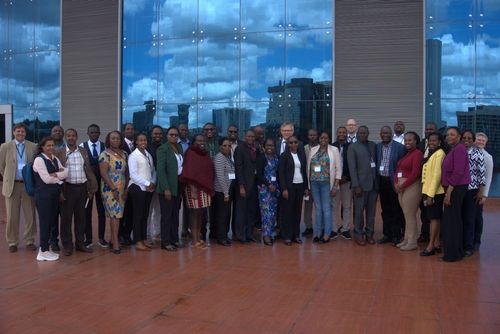
IN FOCUS
Forests in (climate) change: In worse condition despite a wet winter
May 13, 2024
Forests in Germany, especially the main tree species spruce, beech, pine and oak are getting worse. Monitoring data from the Forest Condition Survey show that there have also been bad times for forests in recent decades due to storm events, acid rain or infestations by harmful insects. Since 2018, however, climate change-induced persistent drought has led to unprecedented levels of damage, which the precipitation in 2023 has hardly changed.

Thünen Institute organizes expert exchange on the University of Nairobi campus

The cod stock in the eastern Baltic Sea has been in crisis for years. Despite historically low fishing pressure, the stock is not recovering. Until now, there has been no conclusive explanation for this. Researchers have now shown for the first time that cod lack food in regions with increased…

The book "A Place of Research", published in March 2023, about the history of the Braunschweig-Völkenrode research site - now the headquarters of the Thünen Institute - is now also available digitally.
The Thünen Institute.
Research and policy advice on rural areas, agriculture, forests and fisheries.
As a research institute in the portfolio of the Federal Ministry of Food and Agriculture (BMEL), we work at the interface of science, politics and society.
- 1.148
Employees, 573 of them scientists
- 15
Institutes conduct research in the fields of rural areas, agriculture, forestry and fisheries
- 1.089
Lectures in 2021
- 859
Publications in 2021
Job Offers
Technische Assistenz (w/m/d) Entgeltgruppe 9 a TVöD-Bund
biologisch-technische Assistenz (w/m/d) (BTA, CTA, VMTA)
Projektkoordinator*in (w/m/d) Fachrichtung Marine Biologie, Fischereibiologie oder vergleichbare Disziplin
New publications
- 0
Mehl P, Kordel S, Meschter D, Schneider H, Spenger D, Weidinger T (2023) Alltagsmobilität und Erreichbarkeit: Schlüsselfaktoren für Teilhabechancen und Bleibeorientierungen der Geflüchteten in ländlichen Regionen. In: Mehl P, Fick J, Glorius B, Kordel S, Schammann H (eds) Geflüchtete in ländlichen Regionen Deutschlands. Wiesbaden: Springer VS, pp 161-190, DOI:10.1007/978-3-658-36689-6_7
- 1
Zubizarreta M, Arana-Landin G, Wolff S, Egiluz Z (2023) Assessing the economic impacts of forest certification in Spain: a longitudinal study. Ecol Econ 204, Part A:107630, DOI:10.1016/j.ecolecon.2022.107630
- 2
Kordel S, Gasch S, Glorius B, Mehl P, Osigus T, Schammann H, Schneider H, Spenger D, Weidinger T, Younso C (2023) Bleibeorientierung Geflüchteter, die Rolle der Aufnahmegesellschaft und Haltestrategien der Lokalpolitik. In: Mehl P, Fick J, Glorius B, Kordel S, Schammann H (eds) Geflüchtete in ländlichen Regionen Deutschlands. Wiesbaden: Springer VS, pp 127-159, DOI:10.1007/978-3-658-36689-6_6
- 3
Haeler E, Bolte A, Buchacher R, Hänninen H, Jandl R, Juutinen A, Kuhlmey K, Kurttila M, Lidestav G, Mäkipää R, Rosenkranz L, Triplat M, Vilhar U, Westin K, Schueler S (2023) Forest subsidy distribution in five European countries. Forest Pol Econ 146:102882, DOI:10.1016/j.forpol.2022.102882
- 4
Westin K, Bolte A, Haeler E, Haltia E, Jandl R, Juutinen A, Kuhlmey K, Lidestav G, Mäkipää R, Rosenkranz L, Triplat M, Skudnik M, Vilhar U, Schüler S (2023) Forest values and application of different management activities among small-scale forest owners in five EU countries. Forest Pol Econ 146:102881, DOI:10.1016/j.forpol.2022.102881

![[Translate to English:] Logo des Bundesministerium für Ernährung und Landwirtschaft](/media/allgemein/logos/BMEL_Logo.svg)